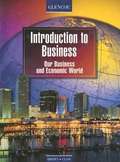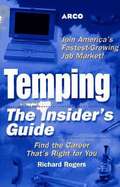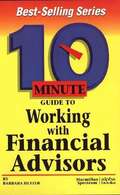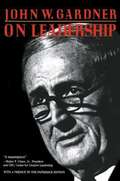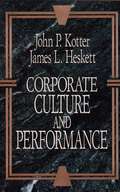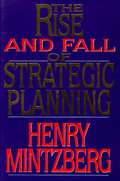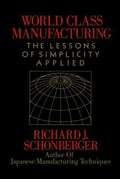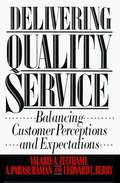- Table View
- List View
Succeeding in the World of Work (4th Edition)
by Ben S. Vineyard Gady KimbrellVocational Guidance textbook for high school students
Succeeding in the World of Work
by Ben S. Vineyard Gady KimbrellVocational Guidance textbook for high school students
Introduction to Business: Our Business and Economic World
by Betty J. Brown John E. Clow Mcgraw-Hill StaffFrom entrepreneurship to the global economy, Introduction to Business introduces your students to the ever-changing world of business and economics. It's up-to-date, full of high interest features, and designed to help your students explore business opportunities while learning to make their own informed economic decisions.
Succeeding in the World of Work: Student Activity Workbook (6th Edition)
by Grady Kimbrell Ben S. VineyardSucceeding In The World Of Work Student Activity Workbook for High School Students
Economics: Principles and Practices
by Gary E. ClaytonThis book contains topics on Fundamental Economic Concepts, Micro Economics, Macro Economics (Institutions, Policies), International and Global Economics. Profiles in Economics, Economics in Action (Video Activities), Interactive Economics (Computer Activities), Surfing the Net (Web Activities), Technology Activities, Skills (Economic, Critical Thinking, Technology and Life). Also included are Charts, Maps and Graphs.
Glencoe Economics: Today and Tomorrow
by Roger Leroy MillerEconomics: Today and Tomorrow incorporates the 21 Basic Concepts established in "A Framework for Teaching the Basic Concepts," published by the National Council on Economic Education.
Temping: The Insider's Guide
by Richard Rogers"Get the inside scoop on the temp track: how to choose a temporary agency; salaries and benefits; your responsibilities to the agency and the client; professional temp positions; getting on the agency's "A" list; and much, much more."--BOOK JACKET. Title Summary field provided by Blackwell North America, Inc. All Rights Reserved
The 10 Minute Guide to Working with Financial Advisors
by Barbara HetzerFinding the right person to provide guidance on important financial decisions can be difficult. This book explains the differences between the various types of financial professionals and discusses how to find them and how to check their credentials and references.
The Complete Idiot's Guide® to Economics
by Tom GormanLocal or global, economic issues are on the public's mind-but making sense of supply and demand isn't so simple. This book explains in everyday terms how markets work, introducing the key players-consumers, business, and government-and using their behavior to illustrate basic theories and ideas. In addition, it coaches both general readers and students in the key concepts and analytical tools of macroeconomics and microeconomics, and teaches the dynamics of markets, consumer behavior, business investment, budgets and taxation, recession and expansions, unemployment and inflation, and more.
The Poor Pay More: Consumer Practices of Low-Income Families
by David CaplovitzHas delineated with uncompromising, scientific evidence the brutal economic facts of existence for a group of low-income families in four New York City housing projects.
On Leadership
by John W. GardnerLeaders today are familiar with the demand that they come forward with a new vision. But it is not a matter of fabricating a new vision out of whole cloth. A vision relevant for us today will build on values deeply embedded in human history and in our own tradition. It is not as though we come to the task unready. Men and women from the beginning of history have groped and struggled for various pieces of the answer. The materials out of which we build the vision will be the moral strivings of the species, today and in the distant past. Most of the ingredients of a vision for this country have been with us for a long time. As the poet wrote, "The light we sought is shining still." That we have failed and fumbled in some of our attempts to achieve our ideals is obvious. But the great ideas still beckon--freedom, equality, justice, the release of human possibilities. The vision is to live up to the best in our past and to reach the goals we have yet to achieve--with respect to our domestic problems and our responsibilities worldwide.
Service Breakthroughs
by James L. Heskett W. Earl Sasser Christopher W. L. Hart Jr.What Do Citicorp, UPS and Marriott have in common? They are "breakthrough" service providers,firms that changed the rules of the game in their respective industries by consistently meeting or exceeding customer needs and expectations. To find out how these companies do it, service management experts James Heskett, Earl Sasser, and Christopher Hart put the question to the chief executive officers of fifteen of America's leading service firms attending a workshop at the Harvard Business School. Breakthrough leaders, they discovered, think very differently about their businesses than do their competitors, in distinct and well-defined ways. Now, in Service Breakthroughs, based upon five years of exhaustive research in fourteen service industries, Heskett, Sasser, and Hart show exactly what enables one or two companies in each industry to constantly set new standards for quality and value that force competitors to adapt or fail. At the heart of breakthrough performance, the authors contend, is a sometimes intuitive but thorough understanding of the "self-reinforcing service cycle" that replaces traditional management of "trade-offs." The "cycle" is a paradigm derived from the research results suggesting direct links between heightened customer satisfaction, increased customer retention, augmented sales and profit, improved quality and productivity, greater service value per unit of cost, improved satisfaction of service providers, increased employee retention, and further heightened customer satisfaction. With detailed examples and dramatic case studies of Mark Twain Bancshares, American Airlines, Florida Power & Light, Federal Express, McDonald's and many other companies, Heskett, Sasser, and Hart show how this self-reinforcing cycle of behavior differentiates breakthrough leaders from their "merely good" competitors. The authors describe how breakthrough managers develop counter-intuitive, even contrarian, strategic service visions. These companies define their "service concept" in terms of results achieved for customers rather than services performed. They target market segments by focusing on psychographics -- how customers think and behave -- instead of demographics. And instead of viewing a service delivery system as a facility where the service is produced and sold, breakthrough firms see it as an opportunity to enhance the quality of the service. These profound differences in thought and action have brought spectacular results. For managers who wish to set the pace in their service industries, Service Breakthroughs will be essential reading.
Corporate Culture and Performance
by John P. Kotter James L. HeskettGoing far beyond previous empirical work, John Kotter and James Heskett provide the first comprehensive critical analysis of how the "culture" of a corporation powerfully influences its economic performance, for better or for worse. Through painstaking research at such firms as Hewlett-Packard, Xerox, ICI, Nissan, and First Chicago, as well as a quantitative study of the relationship between culture and performance in more than 200 companies, the authors describe how shared values and unwritten rules can profoundly enhance economic success or, conversely, lead to failure to adapt to changing markets and environments.With penetrating insight, Kotter and Heskett trace the roots of both healthy and unhealthy cultures, demonstrating how easily the latter emerge, especially in firms which have experienced much past success. Challenging the widely held belief that "strong" corporate cultures create excellent business performance, Kotter and Heskett show that while many shared values and institutionalized practices can promote good performances in some instances, those cultures can also be characterized by arrogance, inward focus, and bureaucracy -- features that undermine an organization's ability to adapt to change. They also show that even "contextually or strategically appropriate" cultures -- ones that fit a firm's strategy and business context -- will not promote excellent performance over long periods of time unless they facilitate the adoption of strategies and practices that continuously respond to changing markets and new competitive environments.Fundamental to the process of reversing unhealthy cultures and making them more adaptive, the authors assert, is effective leadership. At the heart of this groundbreaking book, Kotter and Heskett describe how executives in ten corporations established new visions, aligned and motivated their managers to provide leadership to serve their customers, employees, and stockholders, and thus created more externally focused and responsive cultures.
The Rise and Fall of Strategic Planning
by Henry MintzbergIn this definitive and revealing history, Henry Mintzberg, the iconoclastic former president of the Strategic Management Society, unmasks the press that has mesmerized so many organizations since 1965: strategic planning. One of our most brilliant and original management thinkers, Mintzberg concludes that the term is an oxymoron -- that strategy cannot be planned because planning is about analysis and strategy is about synthesis. That is why, he asserts, the process has failed so often and so dramatically. Mintzberg traces the origins and history of strategic planning through its prominence and subsequent fall. He argues that we must reconceive the process by which strategies are created -- by emphasizing informal learning and personal vision -- and the roles that can be played by planners. Mintzberg proposes new and unusual definitions of planning and strategy, and examines in novel and insightful ways the various models of strategic planning and the evidence of why they failed. Reviewing the so-called "pitfalls" of planning, he shows how the process itself can destroy commitment, narrow a company's vision, discourage change, and breed an atmosphere of politics. In a harsh critique of many sacred cows, he describes three basic fallacies of the process -- that discontinuities can be predicted, that strategists can be detached from the operations of the organization, and that the process of strategy-making itself can be formalized. Mintzberg devotes a substantial section to the new role for planning, plans, and planners, not inside the strategy-making process, but in support of it, providing some of its inputs and sometimes programming its outputs as well as encouraging strategic thinking in general. This book is required reading for anyone in an organization who is influenced by the planning or the strategy-making processes.
World Class Manufacturing: The Lessons of Simplicity Applied
by Richard J. SchonbergerOffers a demystified explanation of the simple techniques that have fueled Japan's industrial success
The Advertising Kit: Complete Guide for Small Businesses
by Jeanette SmithPresents information on Advertising for small businesses, how to maximize advertising dollars and get your message out.
Delivering Quality Service: Balancing Customer Perceptions and Expectations
by Valarie A. Zeithaml A. Parasuraman Leonard L. BerryWhat exactly is excellent service? Here's a model that provides insight into customer expectations and service delivery.
Psychology: Principles in Practice
by Spencer A. RathusOne needs to develop a variety of critical thinking skills to fully grasp the range of concepts and methods used in the study of psychology and this book guides one to achieve that.
Investments: An Introduction, Fifth Edition
by Herbert B. MayoThis is an Intro to Investment college textbook. Some of the graphs, tables, illustrations, and picture captions are not included. Some of the text has been altered for easier computer reading.
Contemporary Business (1997 Edition)
by David L. Kurtz Louis E. BooneThis is an Intro to Business college textbook. Graphs, tables, illustrations, and picture captions are not included. Some of the text has been altered for easier computer reading.
Basic Marketing Research
by Gilbert Churchill Jr.Basic Marketing Research is designed for the introductory undergraduate course in marketing research.
Principles of Microeconomics (2nd Edition)
by N. Gregory MankiwIn this textbook, Mankiw's conversational writing style helps in presenting the politics and science of economic theories to tomorrow's decision-makers. The book is intriguing students to apply an economic way of thinking in their daily lives.
Principles of Macroeconomics (2nd Edition)
by N. Gregory MankiwIn writing this textbook, Mankiw has tried to put himself in the position of someone seeing economics for the first time. The author's conversational writing style is superb for presenting the politics and science of economic theories to tomorrow's decision-makers. Because Mankiw wrote it for the students, the book stands out among all other principle texts by intriguing students to apply an economic way of thinking in their daily lives. Receiving such praise as "perhaps the best ever" textbook in economic principles, it's no wonder Mankiw's prize project has quickly become one of the most successful books ever to be published in the college marketplace.
International Business (Sixth Edition)
by Michael H. Moffett Ilkka A. Ronkainen Michael R. CzinkotaThis text addresses itself to the issues involved in doing business abroad. It includes theory and research, some basic geography and culture, suggestions for even the small companies to use technology to reach other countries, and more.
Holt Economics
by Robert L. PenningtonHelping you develop critical thinking skills is an important tool of Holt Economics. Throughout Holt Economics, you are asked to think critically about the events and processes that shape your global, national and local economy. Critical thinking is the reasoned judgment of information and ideas.

